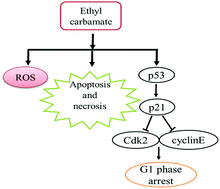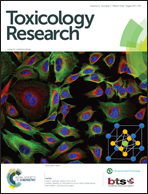In vitro toxicological evaluation of ethyl carbamate in human HepG2 cells
Abstract
Ethyl carbamate (EC) is a multi-site carcinogen in experiment animals and probably carcinogenic to humans (IARC group 2A). The present study was designed to investigate the cytotoxicity effect of EC on human hepatoma G2 (HepG2) cells. The results revealed that EC inhibited the viability of HepG2 cells significantly in a dose-dependent manner. Further analysis indicated that high concentration of EC induced cell apoptosis, inhibited the G1 to S phase transition along with increased expression of p53 and p21 and decreased the expression of cyclin E and Cdk 2, but no significant change in p27 expression was observed, which were evidenced by both real time PCR and western blotting analyses. Moreover, the results of the DCFH-DA assay suggested that oxidative stress was involved in the cytotoxic effects of EC. Altogether, the present work indicated that p21, cyclin E and Cdk2, which were regulated by p53, might account for the effect of EC on cell viability and cell cycle arrest, but p27 was not involved in the pathway in HepG2 cells treated with EC.


 Please wait while we load your content...
Please wait while we load your content...